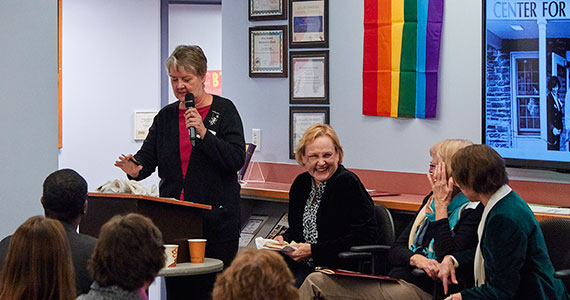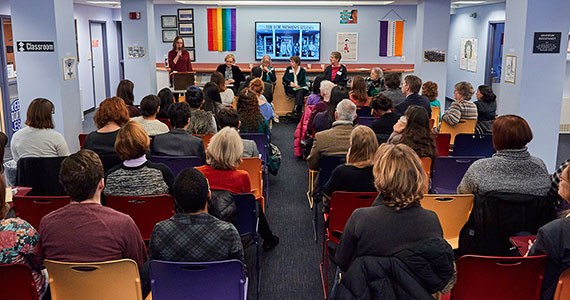
Kay Johnston, professor of educational studies and women’s studies, emerita, speaks during the 20th anniversary event. (Photo by Dylan Crouse ’15)
Looking out into the sea of faces seated in the newly renovated Women’s Studies Center, the previous directors and faculty members integral to the formation of the Women’s Studies Program shared laughs, stories, and occasional tears as they celebrated the center’s 20th anniversary.
The November 8 event included a ribbon cutting to officially open the newly renovated center in East Hall, a panel discussion, and break-out sessions to discuss university policies; resources, health, and programming; and activism.
The panel discussion involved Debbie Knuth Klenck, Wanda Warren Berry, Liz Brackett, Kay Johnston, and Mary Bufwack. These current and former faculty members reflected on the challenges of being among the first women faculty members on campus, the discrimination they faced, the positive changes, and areas they see still needing improvement.
They talked about how women were originally only hired as part-time faculty, and that it took years to get women hired as full-time faculty on tenure tracks. In 1962, Gretchen Kreuter and Berry were the first two women to join Colgate’s faculty as part-time faculty. Jane Lagoudis Pinchin was hired as the first full-time woman professor at Colgate in 1965, and Carol Bleser was the first tenured woman professor.
Brackett said that some believed that women would never be admitted to Colgate, and how momentous it was when women students entered with full-time status in 1970.
Twelve women, a small but significant minority, had joined the faculty by 1971, many of them on a part-time basis.
The panelists reflected on what it was like to be a female professor teaching to a nearly all-male class on a mostly all-male faculty. Gender equity was an issue they confronted and worked hard through years of assertive action at correcting, and they discussed how it remains an issue today.
In providing a history lesson of sorts, the panelists shared a timeline of important moments including creation of the now very popular brown bag lunches, the first women’s festivals, and creation of a women’s living environment called Bolton House.
They also discussed how the Office of LGBTQ Initiatives found its home in the Women’s Studies Center in 2009. In 2013, Christina Serna, assistant professor of women’s studies, was hired as the first women’s studies faculty member to be able to teach all of her classes within the Women’s Studies Program.
Overall, the conversation highlighted how far women’s studies and LGBTQ studies have come on campus. Panelists also touched on how much change still needs to happen so that Colgate can be a more inclusive and safe campus for everyone.
One overarching theme of the event was clear: “There is a lot to celebrate but also work to be done,” said Meika Loe, director of the Women’s Studies Program, in her closing remarks. “We honor what has come before, and stand on shoulders of giants.”

